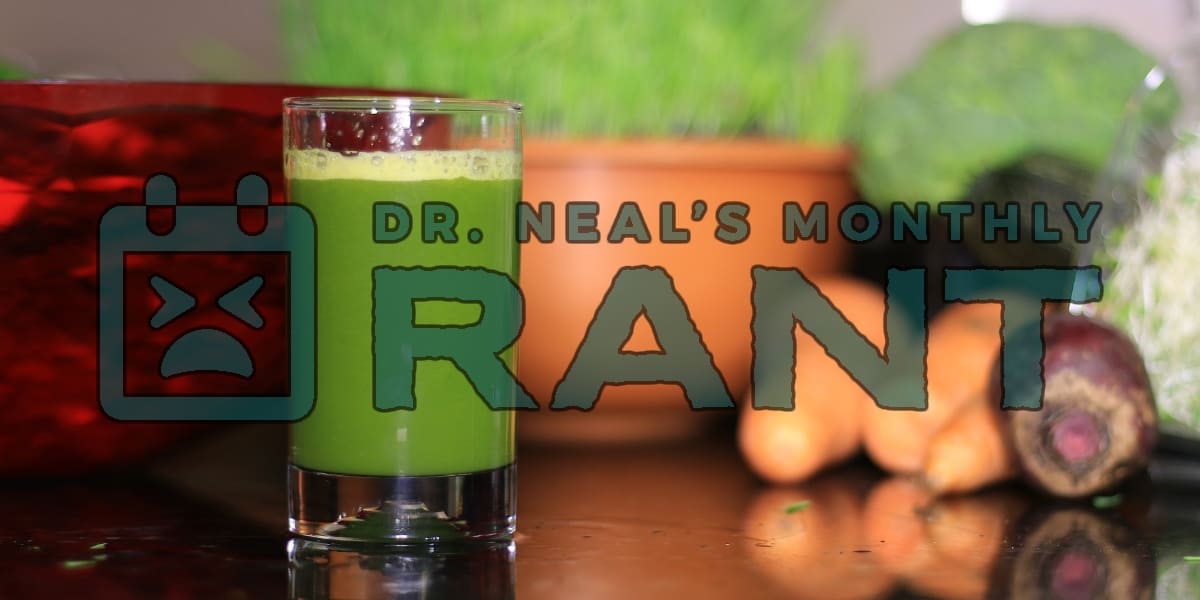This month we attack juicing. Whether it’s the “100% natural” juice you see in the store (organic or not!) or at-home juicers, there are some key myths to address. We’ll take you on a behind-the-scenes journey through the juice manufacturing process using oranges as an example.
Imagine a nice Sunday breakfast – bacon, eggs, hash browns, biscuits, and a nice glass of orange juice to wash it all down. Orange juice is so bright and sunny and full of vitamins and nutrition, right?
Wrong. In fact, it couldn’t be farther from the truth.
Oranges are harvested and taken to the juice factory. There they are juiced, separating the pulp and fiber, which are put aside for use later. The juice is then stored in huge tanks for up to a year. No joke. As you can imagine, after sitting in a tank for a year the juice is pretty tasteless.
“But [Brand Name X] tastes awesome!” Why does store-bought juice always taste the same all year long? Why do different brands always taste different from each other? This flavor pack is why.
Juice companies hire flavor companies – the same ones that formulate perfumes for Dior and Calvin Klein – to engineer flavor packs to add back to the juice to make it taste fresh. Those in the industry will tell you that the flavor packs are all-natural. But, whether made from reconstituted or pasteurized orange juice, they resemble nothing found in nature.
The packs added to juice in America tend to contain high amounts of ethyl butyrate, a chemical in the fragrance of fresh-squeezed orange juice. So the next time you open a bottle of OJ, say to yourself, “Mmm… Ethyl butyrate.”
“I’ve never seen a flavor pack or anything like that on the label!” As with all good industries, the juice industry bought themselves an exemption from “the man”. The FDA doesn’t require them to put the flavor pack in the list of ingredients.
On top of the gross flavor stuff, when you pasteurize juice products and leave them in jars on the shelf they lose the vast majority of their nutritional value and their water-soluble phytochemicals break down very quickly. They add back ascorbic acid (Vitamin C made from corn syrup) and other chemical vitamins. Our patients know this is not the real deal!
So what happens to this pasteurized pulp? Well, some is added back in, because some people like pulp in their juice. But mostly, the pulp is processed for the essential oils and fiber. The oils are extracted via a heat process and sold to fragrance companies that want that distinct citrus aroma. The fiber is sold off to companies that sell fiber supplements; this is often marketed as citrus fiber. The remaining heavily treated product is then sold to vitamin companies.
I would be hard-pressed to find a waste product that supplement companies have not been thrilled to buy.
This heavily processed, leftover waste product is then added to your Vitamin C pill (that is synthesized from sugar), so that companies can say, “VITAMIN C WITH BIOFLAVONOIDS, OMG IT’S NATURAL!”
BUT I MAKE MY OWN JUICE!
Ok, two things: 1. That’s fine, in moderation. 2. Most juicers don’t do moderation.
If you make any juice, at home or on a mass scale, you remove the pulp from the juice. Freshly squeezed juice is good. It has good healthy stuff, but it also has naturally occurring fructose or sugar.
Our bodies lack a proper mechanism for getting “full” from sugar. That’s why I can eat an extra-large bag of kettle corn in one sitting. The fiber found in the pulp of fruits, however, sends signals after a certain amount to tell your body “I’m full.”
Pulp also has its own health benefits. It has essential oils, proteins, enzymes, and stuff crucial for helping you absorb juice nutrients.
So when we drink juice, we remove one of the most beneficial portions of the fruit or vegetable, and on top of that, we concentrate the sugar.
Our recommendation: Go ahead and juice, at home, once a day at most. But even better: make smoothies. Get the whole fruit/vegetable in there and get ALL the beneficial ingredients. Vitamix or Nutribullets are good because they keep all the good stuff in place.
See, it is possible to talk about OJ and pulp without making pop culture references!
Our superfoods, greens, and proteins are Vitality Approved, so you can be sure that you’re getting quality products: pure, potent, and consistent batch to batch.
Just trying to keep it real…

Neal Smoller, PharmD
Owner, Pharmacist, Big Mouth
[email protected]



